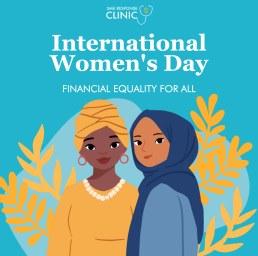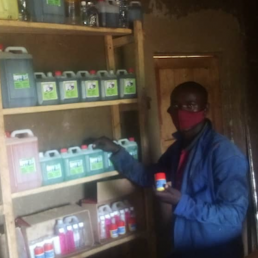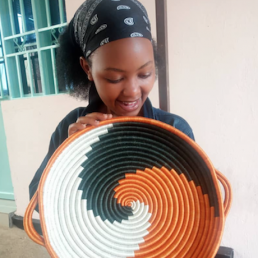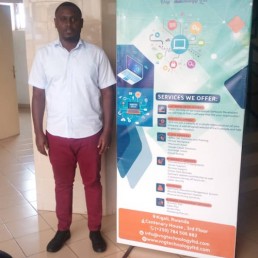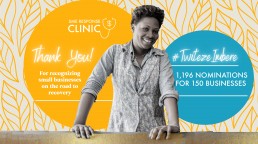Meet three incredible women entrepreneurs as we celebrate women this March.
This video was originally posted on the SME Response Clinic
Meet three incredible women entrepreneurs as we celebrate women this March.
This March, join us as we reflect on and celebrate the vital role women play in our communities and the tremendous contribution they make to our economy. The SME Response Clinic spoke to three women entrepreneurs to understand what women’s month means to them s, what motivated them to start their own businesses, and get their advice for aspiring women entrepreneurs.
Here is what they had to say!
Celebrating Women's Entrepreneurship in Rwanda
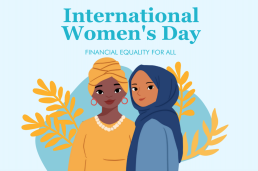
Celebrating Women’s Entrepreneurship in Rwanda
A version of this article was originally posted on the SME Response Clinic
Women entrepreneurs represent the fastest-growing segment of entrepreneurs globally, and Rwanda is no exception. According to the 2020 FinScope Gender Report, women lead about 52% of micro, small, and medium enterprises (MSMEs) in Rwanda (or about 420,0000 businesses). Through these businesses, women entrepreneurs are significant contributors to GDP growth and create jobs critical to people’s livelihoods in their communities and the country at large.
At the SME Response Clinic, we value women entrepreneurs’ role in Rwanda’s economic and social development. Since our launch in May 2020, we have developed content, hosted webinars, and conducted targeted marketing activities to better reach women entrepreneurs and support them in business growth despite tough times.
This month, we will focus our efforts on celebrating the role played by women entrepreneurs in developing the entrepreneurship ecosystem in Rwanda. We will highlight some of the exceptional women entrepreneurs we have encountered so you can learn from their experiences or maybe find a new business to try out!
Join us this month as we celebrate – and reach out to us to share the name of a women-led business you know and love at musa.kacheche@consumercentrix.ch!
Anna Gincherman to Speak at 2021 Financial Alliance for Women Annual Summit

Anna Gincherman to Speak at 2021 Financial Alliance for Women Annual Summit
Anna Gincherman, a Partner at ConsumerCentriX, will speak at the Financial Alliance for Women’s Annual Summit for the third consecutive year. The Summit is known as the world’s most seminal and comprehensive event for women’s financial inclusion, with participation from bankers, policymakers, multilateral and bilateral officials, academics, and other stakeholders.
The 2021 Summit, titled “Investing in Women, Transforming Our World,” will address a wide range of topics, including introducing national measures to promote female-friendly entrepreneurial ecosystems, designing gender-aware fintechs, and developing tomorrow’s JEDI (justice, equality, diversity, and inclusion) workforce.
This year the event will take place virtually between October 5 and 7.
More information about the event can be found here.
The SME Response Clinic Partners with KCB Bank

The SME Response Clinic Partners with KCB Bank
A version of this article was originally posted on the SME Response Clinic
The SME Response Clinic has partnered with KCB Bank Rwanda as part of our ongoing efforts to bring entrepreneurs even closer to financial institutions that offer access to finance and non-financial services to meet business needs through COVID-19 and beyond.
Through this partnership, entrepreneurs will have access to timely information on KCB Bank’s financial products as well as non-financial services such as KCB Bank’s Biashara Club, which features preferential offerings, trainings, business workshops, and networking opportunities. Through the partnership, SME Response Clinic visitors will also have a direct line to the institution at +250788140000.
We are excited about the opportunities this partnership can create for your businesses, and we look forward to providing you with regular updates on KCB Bank Rwanda’s products and services!
ConsumerCentriX best-in-class training to support financial institutions serving the SME segment goes virtual
ConsumerCentriX best-in-class training to support financial institutions serving the SME segment goes virtual
ConsumerCentriX has a long history of working to support financial institutions serving small- and medium-enterprises (SMEs).
SMEs face a tremendous financing gap, and many do not have access to the kinds of business development services that make them stronger potential borrowers with the skills to grow their businesses as usual or to manage disruptions like COVID-19. SMEs face unique challenges and have specific needs.
On the other hand, financial institutions have a hard time grappling with understanding the full financial picture of many businesses in this segment, and as a result, find it challenging to lend to SME entrepreneurs, whose recordkeeping varies and who may bank with multiple banks (or none at all).
The financial institutions that serve SMEs – both those who want to serve them for the first time and those who want to serve them better – need to consider implementing an approach that enables them to better understand their SME customers: a relationship management approach. This approach entails establishing and maintaining long-term relationship with customers centered around providing solutions that meet customer needs rather than just promoting one product or service. In turn, this ensures a greater share of wallet for the bank.
Effective relationship management in SME banking requires strong Relationship Managers with skills in connecting with customers and understanding how to analyze businesses in this unique segment as well as in monitoring post-disbursement to address potential issues before they arise or to identify additional needs customers may have. Earlier this year, ConsumerCentriX developed and launched a four-part virtual training program to support Relationship Managers in honing their skills to better serve the SME segment. The best-in-class curriculum centers around four key areas essential to serving SMEs:

Relationship Management
Provides trainees with foundational skills needed to build a relationship with customers and real-life examples to complement learnings

Gender Awareness
Identifies and addresses potential biases trainees may have in approaching or assessing women entrepreneurs

Business and Credit Analysis
Focuses on techniques to collect, cross-check, and analyze business information to conduct an efficient credit analysis using quantitative and qualitative information

Decision Formalization and Portfolio Management
Hones trainees’ technical skills in preparing credit proposals, including identifying potential risks and mitigation strategies that are monitored from loan origination throughout the repayment period.
ConsumerCentriX transformed these topics, normally covered in 8 days of in-person classroom training, into 4 online modules with 26 mini-sessions of between 20 and 45 minutes. The mini-sessions include animations, exercises, and videos that aim to bring life to self-paced virtual learning.
We recently piloted the training with Stanbic Bank Uganda Limited (SBU), one of the largest commercial banks in Uganda with a strong footprint among SMEs that aims to expand its reach and deepen its engagement in the sector.
What have we learned?
While the pilot is still underway, ConsumerCentriX is already seeing results and has been able to leverage preliminary learnings to make small tweaks to enhance the effectiveness of the virtual training.
Importantly, trainees are successfully learning the theoretical knowledge presented in the self-paced virtual sessions. While online learning has become frequent due to COVID-19, the sessions developed for this training are short and as interactive as possible to avoid some of the fatigue that has become common with participating in online events.
Pearl Akol, an Enterprise Direct Business Banker at SBU, shared that as a result of completing the relationship management component of the online training, she has “understood that you have to listen to the customer carefully and match a solution to the customer’s need” rather than to focus on selling a particular product. It transforms the way she approaches conversations with new and existing customers and is sure to have an impact on the bank’s bottom line. For Alex Insingoma, an Enterprise Direct Business Banker, the gender awareness module was eye-opening. “After going through this training, I was able to recognize the importance of women in business given their big numbers and their unique way of running businesses,” he said.
While theoretical knowledge can be effectively transmitted through self-paced virtual sessions, live online discussions and practice sessions best ensure information is internalized by trainees. Typically, ConsumerCentriX follows up our in-person SME training programs with hands-on coaching and mentoring done with trainees at their branches and in the field. This kind of approach can be difficult to replicate online, but other techniques can be used instead. We incorporated live virtual coaching sessions moderated by our expert SME team to smaller groups of 5-7 people for 1.5 hours at a time. They focus on addressing main challenges faced by participants on any of the content, provide a dedicated time for trainees to practice specific tools or skills acquired, and offer participants the opportunity to discuss real case studies from actual entrepreneurs.
Lastly, proper planning and oversight by the financial institution are critical to success. ConsumerCentriX usually conducts multiple planning meetings in advance of in-person training to outline the objectives, ensure staff availability, and to identify how outcomes will be tracked in close collaboration with the partner financial institution. These steps cannot be skipped for virtual learning.
- First, an institution needs to identify its goals – particularly the behavior changes and outcomes that it aims to see as a result of the training.
- Then, time needs to be set aside for staff to complete the training – this can be a number of hours per day or week within a certain period of time. This needs to be communicated to staff, and follow-ups should be conducted by managers to ensure staff are completing modules within designated deadlines.
- Finally, the institution needs to identify the key performance indicators it will track to understand outcomes – if a financial institution wants to see additional business generated as a result of the training, key performance indicators around new leads or a greater share of wallet should be clearly communicated at the start of training, monitored during training, and tracked over time once training is completed.
ConsumerCentriX looks forward to completing the pilot training with SBU over the next few months and partnering with other financial institutions across Sub-Saharan Africa and beyond to continue to serve SMEs despite challenging times. If you are interested in learning more or partnering with us, contact info@consumercentrix.ch.
.
Meet the Winners and Nominees of the SME Response Clinic Awards
We are proud to feature the 30 businesses shortlisted for the SME Response Clinic Business Awards through the Twiteze Imbere campaign, which celebrated the role small businesses play in the country’s journey to recovery following COVID-19. We received around 1,200 nominations from across the country in three categories: established businesses, women-owned businesses, and startup/innovative businesses. Congratulations to the businesses that were shortlisted and we wish them the best in their growth!
MEET THE SHORTLISTED NOMINEES
Announcing the Twiteze Imbere Campaign Award Celebration

Celebrating the Twiteze Imbere Campaign Award Winning Small Businesses
To recognise and celebrate the winners of the Twiteze Imbere campaign SME Response Clinic Business Awards, and reflect on the campaign, Access to Finance Rwanda (AFR) and ConsumerCentriX hosted a half-day celebration alongside key campaign partners on May 19th.
The Twiteze Imbere campaign was created to recognize the role small businesses are playing in Rwanda’s economic recovery from the COVID-19 pandemic. Through the campaign, the general public nominated their favorite small businesses, giving their nominees the chance to win an SME Response Clinic Business Award. The competition featured three categories: women-owned businesses, start-up or innovative businesses, and established businesses. Three winners and five runners-up stood out from almost 2,000 nominations.
During the celebration, Jean Bosco Iyacu, Country Director of AFR, congratulated the winners and thanked them for their role in Rwanda’s economic recovery. Mr. Iyacu also highlighted AFR’s ongoing efforts to support small businesses in Rwanda and appreciated the diversity within the businesses that were nominated.
Anna Gincherman, Managing Partner at ConsumerCentriX, encouraged the entrepreneurs to utilise the SME Response Clinic’s resources to grow their businesses.
“The SME Response Clinic will continue to support entrepreneurs by providing access to financial opportunities and information on business development services,” she said.
The three winners discussed how they plan to use the one million Rwandan francs prize to grow their businesses. They responded to some questions from partners and networked with business development experts including RICEM’s Dr. Olivier Mukulira and Malik Shaffy, Country Manager of the African Management Institute in Rwanda (AMI).
Jean Bosco Manirareba, winner in the established businesses category, said that the prize money will be invested to expand market reach beyond Kirehe District where Umucyo operates.
Hamdani Habumuremyi, winner of the start-up/innovative business category said: “The prize money will allow me to acquire new machinery and equipment to support my business activities.”
Judith Kaine, winner in the women-led businesses category said: “I plan to use the award to increase visibility and awareness of my business across Rwanda.”
In addition to the prize money, the three winners will each receive expert business advisory services provided by Rwanda Institute for Cooperatives, Entrepreneurship and Microfinance (RICEM), and AMI. These services will equip them with the skills and knowledge to further improve the success of their businesses.
Meet the winners here
Winners of SME Response Clinic Business Awards Announced

Press Release - For Immediate Release
Kigali, Rwanda - 30 April 2021
Access to Finance Rwanda, ConsumerCentriX, and Partners Announce Winners of SME Response Clinic Business Awards
- Three diverse Rwandan businesses win inaugural SME Response Clinic Business Awards with Rwf 1,000,000 prize
- Winners selected from 1,200 nominations across the country
- Five runners-up awarded 6-month business skills course
Access to Finance Rwanda and ConsumerCentriX today announced the winners of the inaugural SME Response Clinic Business Awards following the Twiteze Imbere campaign to recognise the role of small businesses in Rwanda’s road to recovery from the COVID-19 pandemic.
Through the campaign, the general public nominated their favourite small businesses, giving their nominees the chance to win an SME Response Clinic Business Award. The competition featured three categories: women-owned businesses, start-up or innovative businesses, and established businesses. Rwandans made online nominations via the SME Response Clinic website and over the phone.
The three winning small businesses and five runners-up were selected from among 30 shortlisted companies after careful and thorough deliberation. Access to Finance Rwanda and ConsumerCentriX are pleased to announce that the winners and runners-up are:
- Women-owned business category:
-
- Winner: Kurema Kureba Kwiga, a public-arts social enterprise located in Kigali
- Runner-up: Kicirwanda, an art and craft store based in Kigali
- Startup/Innovative business category:
-
- Winner: HADI Constructions, a construction consulting firm based in Nyagatare District
- Runners-up: Bhiku Bakery from Rwamagana District and Johnson’s Bakery from Kicukiro District
- Established business category:
-
- Winner: Umucyo Company, a liquid soap manufacturer based in Kirehe District
- Runners-up: Blessed Garden, a female-owned guest house based in Kayonza District, and Crema, a coffee shop located in Musanze District
The awards come as a result of the SME Response Clinic campaign ‘Twiteze Imbere’ (Let’s Move Forward Together), which celebrated the resilience of small businesses and recognised their contribution to Rwanda’s economic recovery. The SME Response Clinic is a platform developed by Access to Finance Rwanda and ConsumerCentriX in collaboration with the Private Sector Federation, the Association of Microfinance Institutions in Rwanda, African Management Institute, New Faces New Voices Rwanda, and Rwanda Bankers’ Association.
“Congratulations to the winners and runners-up of the SME Response Clinic Business Awards. In just a few weeks, we received 1,200 nominations from across the country. We were pleased to see great diversity among the nominated small businesses, enthusiasm from their customers, and the impact they are having in their communities on our journey of COVID-19 recovery,” said Jean Bosco Iyacu, Country Director, Access to Finance Rwanda.
“We are grateful to everyone who took part in the Twiteze Imbere campaign, partner institutions as well as media partners who helped us spread the word. It’s rewarding to see the SME Response Clinic reaching small businesses in every corner of this country and we will continue to support them in these difficult times and beyond,” he added.
“I am honoured and excited to be one of the winners of the SME Response Clinic Business Awards. This award recognises the important role of the creative industry in the economy and the prize money will support my business to grow. Thank you to the SME Response Clinic and its partners for organising this campaign and for looking out for small businesses,” said Judith Kaine, Director of Kurema Kureba Kwiga, one of the winning businesses.
The winner in each category receives a cash prize of Rwf 1,000,000 to invest in their business as well as expert advisory services. Runners-up will be sponsored to participate in the African Management Institute‘s Survive to Thrive programme where they will learn how to navigate business challenges and network with other entrepreneurs in Rwanda and across Africa.
About the SME Response Clinic
In May 2020, Access to Finance Rwanda (AFR) partnered with ConsumerCentriX to launch the SME Response Clinic – a platform that supports entrepreneurs in Rwanda struggling in the face of the COVID-19 pandemic. The SME Response Clinic provides access to training, industry insights, and financial management advice to entrepreneurs in Rwanda struggling to adjust to the economic realities of COVID-19. Access the platform at smeresponse.clinic
About Access to Finance Rwanda
AFR began its operations in 2010 with the core objective of stimulating the development of the financial sector in Rwanda. AFR’s intention is to remove the systemic barriers that hinder access to financial services by putting low-income people particularly the rural poor and women at the centre of its interventions. AFR supports the development and provision of financial services including savings, credit, insurance, payments, and remittances. Learn more at afr.rw.
About ConsumerCentriX
ConsumerCentriX is a strategy consulting firm that works with financial service providers and policymakers on translating consumer insights into market strategies and policies to reach the un/underserved. Our mission is to develop scalable solutions that are based on deep insights into the lives, needs, and constraints of un/underserved people in emerging markets to improve their livelihoods and create opportunities for economic growth.
Media Contact
For any enquiries, write to Nadege Nzeyimana, AFR Communications Consultant, at nadege@afr.rw.
RADIO SHOW | The role of SMEs in the road to recovery

The role of SMEs in the road to recovery
On 18th March 2021, the SME Response Clinic launched the Twiteze Imbere campaign to recognize and celebrate the role SMEs play in Rwanda’s road to recovery from the COVID-19 pandemic. The campaign was supported by the partners of the SME Response Clinic and business development service providers, including the Rwanda Institute of Cooperatives, Entrepreneurship, and Microfinance (RICEM).
During the campaign, a radio show was conducted featuring Esperance Niyitegeka, a lead trainer at RICEM and Angelique Uwimana, an entrepreneur involved in the tailoring business that had gone through RICEM’s training program. Esperance gave a detailed overview of the campaign and highlighted the role SMEs play in Rwanda‘s recovery from COVID-19, sighting their contribution to taxes. Angelique also encouraged women entrepreneurs to participate in the campaign to stand a chance to win and increase their capital, which would help them develop their businesses.
5 ways to enhance employee experience
5 ways to enhance employee experience
During challenging times, many companies have a hard time ensuring good employee experience and morale, which can be especially harmful to business performance. In this video, we discuss five ways your company can improve employee experience and positively impact your bottom line. Get ready to reap the rewards of greater employee engagement!
Script
As a business owner, you are always on a constant journey with your employees. Employee experiences are crucial to your business – they influence employee attitudes and these attitudes in turn form behaviors that eventually drive outcomes. These are five ways you can improve employee experience:
- Exercise an open-door policy.
An open-door policy means that you are open to communication, discussion, and feedback from every employee. This means employees have the liberty to raise their concerns and suggestions outside their chain of command without worrying. With an open-door policy, business owners have a better chance to connect with employees, show their support, and understand employees personally. This arrangement fosters trust and loyalty and strengthens your work relationship with them.
- Check-in individually from time to time.
One-on-one meetings are essential and should help you understand current issues employees may be facing and offer the opportunity for you to provide feedback on employee progress. We know things get busy; therefore, it is crucial to dedicate some time to listen to employees while being supportive through providing positive and constructive feedback.
- Share the bigger picture.
With fewer complicated administrative procedures than a large corporation, consider sharing plans for your business with employees. This will make them feel more valued. It is easy for employees to be more engaged with their work if they better understand your vision for the future, and their contribution can help you achieve a particular goal.
- Exercise flexibility.
Flexible work arrangements are becoming the norm in many businesses across all sectors. Consider flexibility in your business to improve your employees’ work-life balance and quality of life. Being flexible means that you are open, allowing workers time-off, especially during emergencies s. Such arrangements can help to reduce absenteeism, increase productivity, and enhance loyalty.
- Provide employee benefits that are relevant to their needs.
Small businesses may have the idea that employee benefits are costly and unaffordable, and while this may be the case, implementing some benefits makes a massive difference in keeping workers happy, which in turn incentivizes higher productivity. An example of an affordable employee benefit would be to offer options or perks that coincide with the season. For example, introduce summer Fridays so that everyone starts their weekend a few hours early. Most businesses are resuming operation soon in Rwanda; consider implementing these tips to create a conducive environment where your employees have the opportunity to increase their productivity in their work.


